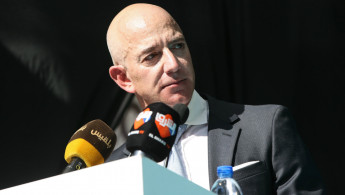Israeli firm may have helped Saudis hack Jeff Bezos' phone, UN experts say
There was information pointing to the "possible involvement" of the Israeli spyware company and MbS in the alleged 2018 cyberattack on Bezo's phone, UN special rapporteurs, Agnes Callamard and David Kaye said.
Both NSO and Saudi officials have denied the allegations.
In a statement, NSO confirmed "unequivocally that our technology was not used in this instance", adding that the allegations "highlight the need for the surveillance community to follow our lead and implement strict Human Rights Policies and to act in a compliant manner".
A forensic analysis by technical experts retained by Bezos after a leak of his personal information in early 2019 suggested that the Bezos' iPhone was compromised by "tools" procured by a close associate of the Saudi de facto ruler.
The suggestion of the Saudi prince's role in the hacking prompted calls for further investigation by UN human rights officials looking into the October 2018 killing of Jamal Khashoggi, a Saudi journalist and contributor to The Washington Post, which is owned by Bezos.
Twitter Post
|
"The alleged hacking of Mr Bezos's phone, and those of others, demands immediate investigation by US and other relevant authorities," UN Special Rapporteurs Callamard and Kaye said in a statement in Geneva.
Any investigation should also look at the "continuous, multi-year, direct and personal involvement of the Crown Prince in efforts to target perceived opponents", they added.
Callamard, the UN expert on summary executions and extrajudicial killings, and Kaye, the expert on freedom of expression, said the latest revelation "suggests the possible involvement of the Crown Prince in surveillance of Mr Bezos, in an effort to influence, if not silence, The Washington Post's reporting on Saudi Arabia".
The technical experts hired by Bezos concluded "with medium to high confidence that Bezos' iPhone was compromised via malware sent from a WhatsApp account used by Saudi Crown Prince Mohammed bin Salman", said the report by FTI Consulting, first reported by the online news site Vice.
Founded in 2010 by Israelis Shalev Hulio and Omri Lavie, NSO Group is based in the Israeli seaside hi-tech hub of Herzliya, near Tel Aviv. It says it employs 600 people in Israel and around the world.
It produces Pegasus, a highly invasive tool that can reportedly switch on a target's cell phone camera and microphone and access data on it, effectively turning the phone into a pocket spy.
NSO Group's annual report filed in February of 2019 listed Israel-based Q Cyber as the only active director and its majority shareholder, according to a lawsuit filed by WhatsApp.
In an interview in early 2019 with Israeli daily Maariv, Hulio was asked about reports that telephone spyware was used to bug Jamal Khashoggi prior to the Saudi journalist's October 2018 murder in Istanbul.
"As a human being and as an Israeli, what happened to Khashoggi was a shocking murder," the company's CEO said.
"I can tell you on the record that Khashoggi was not targeted by any NSO product or technology, including listening, monitoring, location tracking and intelligence collection."
NSO Group's website says the company has "a pioneering approach to applying rigorous, ethical standards to everything we do".
It says it has a vetting process on sales that combines licensing by Israeli export-control authorities with an internal review by a business ethics committee.
The firm has maintained that it only licenses its software to governments for "fighting crime and terror".
UK-based rights group Amnesty International, however, said last year that members and supporters in Israel petitioned the Tel Aviv district court against continued government export approval for NSO Group software.





 Follow the Middle East's top stories in English at The New Arab on Google News
Follow the Middle East's top stories in English at The New Arab on Google News


